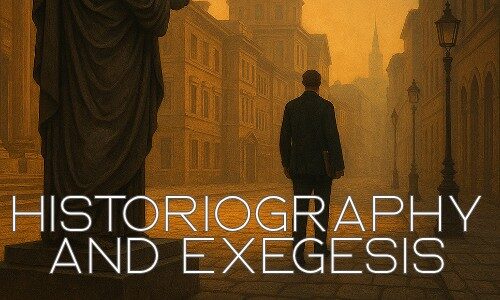This course explores the historical development of biblical scholarship and the various interpretive approaches that have shaped the field. It helps students understand the “why” behind different scholarly conclusions and provides a critical framework for their own work.
Historiography and Exegesis
Level: Doctoral
Course Length: 10 weeks (approx. 150–180 hours total if following full module path)
Delivery Mode: Competency-based, self-paced with required final exam
Course Overview
This course examines the historical development of biblical scholarship and the interpretive approaches that have shaped the field of exegesis. Students will study how different eras of scholarship — from patristic to postmodern — have influenced biblical interpretation, and will learn to critically assess the assumptions behind interpretive methods. Special attention is given to the “why” behind scholarly conclusions, enabling doctoral students to construct their own critical framework for exegetical research.
The course is competency-based:
-
Students may complete all modules and readings to prepare for the final exam, or
-
If they already possess advanced historiographical knowledge, they may skip directly to the final competency exam.
Competency is demonstrated by evaluating scholarly approaches, articulating methodological frameworks, and applying historiographical awareness to exegesis.
Learning Outcomes
By the end of this course, students will be able to:
-
Trace the historical development of biblical interpretation from antiquity to the present.
-
Critically evaluate interpretive methods (e.g., historical-critical, literary, canonical, postmodern).
-
Understand how cultural, theological, and philosophical contexts shaped exegetical conclusions.
-
Identify strengths and weaknesses in differing scholarly approaches.
-
Develop a personal methodological framework for doctoral-level exegesis.
Weekly Breakdown (10 Weeks)
Weeks 1-2: Introduction to Historiography and Exegesis (8–10 hours)
-
What is historiography?
-
Relationship between history of interpretation and exegetical method.
-
Competency: Define historiography in biblical studies and its role in exegesis.
Weeks 3-4: Early Jewish & Patristic Interpretation (12–14 hours)
-
Second Temple hermeneutics.
-
Allegory and typology in Philo and early church fathers.
-
Competency: Evaluate strengths/limits of allegorical interpretation.
Weeks 5-6: Medieval & Reformation Hermeneutics (12–14 hours)
-
Fourfold sense of Scripture (literal, allegorical, moral, anagogical).
-
Reformers: sola scriptura, grammatical-historical method.
-
Competency: Explain how Reformation shifted the trajectory of exegesis.
Weeks 7-8: Enlightenment & Rise of Historical-Critical Method (12–14 hours)
-
Rationalism, empiricism, and skepticism.
-
Source, form, redaction criticism.
-
Competency: Critique assumptions underlying historical-critical method.
Weeks 9-10: 19th–20th Century Developments (12–14 hours)
-
Liberal theology, neo-orthodoxy, existential interpretation.
-
Bultmann and demythologization.
-
Competency: Assess impact of modern theology on exegesis.
Weeks 11-12: Literary & Canonical Approaches (12–14 hours)
-
Narrative criticism, rhetorical criticism, structuralism.
-
Canonical criticism (Childs, Sanders).
-
Competency: Compare literary and canonical methods of interpretation.
Weeks 13-14: Social-Scientific & Contextual Approaches (10–12 hours)
-
Sociological, anthropological, and cultural readings.
-
Feminist, liberation, and postcolonial interpretations.
-
Competency: Evaluate contextual hermeneutics within historiography.
Weeks 15-16: Postmodern Exegesis & Reception History (12–14 hours)
-
Reader-response, deconstruction, intertextuality.
-
Wirkungsgeschichte (history of interpretation’s impact).
-
Competency: Explain how postmodernity reshaped exegetical method.
Weeks 17-18: Building a Critical Framework for Exegesis (12–14 hours)
-
Integrating historical awareness with methodological choice.
-
Balancing critical scholarship with theological commitments.
-
Competency: Draft a personal exegetical methodology informed by historiography.
Weeks 19-20: Integration & Competency Exam Prep (12–14 hours)
-
Case studies across eras (Augustine, Luther, Bultmann, Childs, modern voices).
-
How historiography shapes contemporary debates.
-
Final Competency Exam (required): Students critically analyze interpretive approaches across three eras and apply their own framework to a chosen biblical passage.
Assessment
-
Competency Exam (100%): Students must demonstrate mastery by writing a historiographical analysis of biblical interpretation and applying their chosen methodological framework to exegesis.
-
Optional formative assessments: article critiques, historiographical timelines, and comparative essays (not required).
Curriculum
- 10 Sections
- 20 Lessons
- Lifetime
- Weeks 1-2: Introduction to Historiography and Exegesis (8–10 hours)2
- Weeks 3-4: Early Jewish & Patristic Interpretation (12–14 hours)Second Temple hermeneutics. Allegory and typology in Philo and early church fathers.2
- Weeks 5-6: Medieval & Reformation Hermeneutics (12–14 hours)Fourfold sense of Scripture (literal, allegorical, moral, anagogical). Reformers: sola scriptura, grammatical-historical method.2
- Weeks 7-8: Enlightenment & Rise of Historical-Critical Method (12–14 hours)Rationalism, empiricism, and skepticism. Source, form, redaction criticism.2
- Weeks 9-10: 19th–20th Century Developments (12–14 hours)Liberal theology, neo-orthodoxy, existential interpretation. Bultmann and demythologization.2
- Weeks 11-12: Literary & Canonical Approaches (12–14 hours)Narrative criticism, rhetorical criticism, structuralism. Canonical criticism (Childs, Sanders).2
- Weeks 13-14: Social-Scientific & Contextual Approaches (10–12 hours)Sociological, anthropological, and cultural readings. Feminist, liberation, and postcolonial interpretations.2
- Weeks 15-16: Postmodern Exegesis & Reception History (12–14 hours)Reader-response, deconstruction, intertextuality. Wirkungsgeschichte (history of interpretation’s impact).2
- Weeks 17-18: Building a Critical Framework for Exegesis (12–14 hours)Integrating historical awareness with methodological choice. Balancing critical scholarship with theological commitments.2
- Weeks 19-20: Integration & Competency Exam Prep (12–14 hours)Case studies across eras (Augustine, Luther, Bultmann, Childs, modern voices). How historiography shapes contemporary debates.2
Instructor

